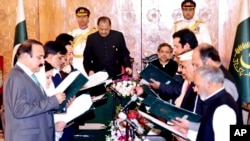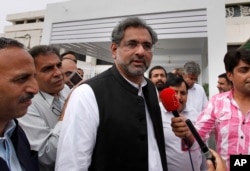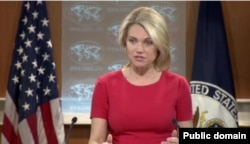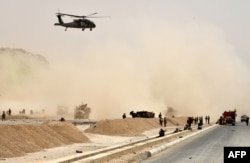Pakistan's new cabinet took oath Friday, concluding a democratic leadership transition process that was set in motion a week ago when a judicial order ousted Prime Minister Nawaz Sharif for concealing assets and plunged the nuclear-armed nation into political uncertainty.
Sharif's ruling Pakistan Muslim League-Nawaz (PML-N), which dominates the parliament together with its allied parties, swiftly nominated and elected Shahid Khaqan Abbasi as the country's new chief executive.
Abbasi, 58, is a close associate of Sharif and was serving as oil minister in the ousted government.
Pakistani President Mamnoon Hussain administered the oath of office to more than 40 cabinet members, mostly known as staunch Sharif allies.
Diplomats, lawmakers and top military officials were among the attendees at the special ceremony. Later, Prime Minister Abbasi chaired the inaugural meeting of his cabinet.
Khawaja Mohammad Asif, who headed the defense and water ministries in the previous cabinet, has become the full-time foreign minister of Pakistan.
Sharif had faced criticism for not appointing a full-time foreign minister and relying on advisers to run external policy matters since he came to power in 2013 for a record third time.
US policies
The political uncertainty gripped the country at a time when the United States is reviewing its Afghan policy amid prevailing concerns and allegations that covert support by the Pakistan military has enabled the Taliban to sustain and intensify its violent campaign in Afghanistan.
"We will certainly look forward to working with [Abbasi] on areas of mutual cooperation," said State Department spokesperson Heather Nauert on Thursday, while congratulating Abbasi on his election.
"As you all know, we have very strong people-to-people ties with the government of Pakistan and we'll look forward to working with Pakistan, and we'll look forward to working with him [Prime Minister Abbasi] as well," she added.
It is being widely reported that President Donald Trump's administration is expected to take a tougher stance on Pakistan in the proposed new strategy to pressure it to do more against militant sanctuaries on Pakistani soil.
Islamabad denies charges it is supporting or sheltering insurgents involved in terrorist activities in Afghanistan, and insists Pakistan is working for peace and stability in the neighboring country in its own national interest and stability.
Counterterrorism efforts
Pakistani officials routinely denounce terrorist attacks against Afghan civilians and forces. In a rare move, Pakistan's military chief, General Qamar Javed Bajwa, on Thursday condemned as terrorism this weeks' Taliban attack in Afghanistan, in which two U.S. troops were killed and four others wounded.
Foreign Ministry spokesman Nafees Zakaria maintains that Pakistan has taken significant steps to counter cross-border terrorism and supports Afghan peace-building efforts.
"We have undertaken various measures that include plugging of gaps, infrastructure development of crossing points and other measures. Our efforts for border management are aimed at facilitating movement of people, trade and transit and curb the movement of undesired elements," Zakaria added.
Officials say that a visiting U.S. delegation headed by an acting special representative for the region, Ambassador Alice Wells, also has been briefed on Pakistan's counterterrorism efforts.
Wells arrived Thursday in Islamabad, and Afghanistan appeared to have dominated her discussions with Pakistani interlocutors.
She met with Asif and Chairman of the Joint Chiefs of Staff General Zubair Hayat, among others, before concluding her two-day visit on Friday, according to a U.S. embassy statement.
"She stressed that Pakistani soil must not be used to plan or conduct terrorist attacks against its neighbors," the statement added.







